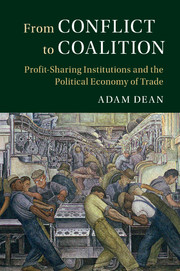Book contents
- Frontmatter
- Dedication
- Contents
- List of Figures
- List of Tables
- Acknowledgments
- 1 Introduction
- 2 A Theory of Profit-Sharing Institutions
- 3 Evidence and Research Design
- 4 The Gilded Wage: Trade Politics in the American Textile and Steel Industries
- 5 Liberalized by Labor
- 6 Trade Politics in Britain and Argentina
- 7 Power Over Profits
- 8 Conclusion
- References
- Index
- Miscellaneous Endmatter
4 - The Gilded Wage: Trade Politics in the American Textile and Steel Industries
Published online by Cambridge University Press: 05 September 2016
- Frontmatter
- Dedication
- Contents
- List of Figures
- List of Tables
- Acknowledgments
- 1 Introduction
- 2 A Theory of Profit-Sharing Institutions
- 3 Evidence and Research Design
- 4 The Gilded Wage: Trade Politics in the American Textile and Steel Industries
- 5 Liberalized by Labor
- 6 Trade Politics in Britain and Argentina
- 7 Power Over Profits
- 8 Conclusion
- References
- Index
- Miscellaneous Endmatter
Summary
This chapter presents a structured-focused comparison of two labor unions in the American textile and steel industries during the late nineteenth century. Overall, the analysis demonstrates that both unions joined their employers in favor of the same trade policy when profit-sharing institutions were present, but openly disagreed with their employers when profit-sharing institutions were absent. In examining the effect of profit-sharing institutions on workers’ trade policy preferences, this chapter also demonstrates how changes in workers’ bargaining power influenced the creation and destruction of profit-sharing institutions.
The first case study focuses on the textile industry in and around Fall River, Massachusetts, a city that dominated the American textile industry during the late nineteenth century. In 1883, Fall River's textile mills produced an astounding 60 percent of all print cloth produced in the United States, earning the city the nickname of the “Spindle City.” The analysis focuses on the highest skilled textile workers, the mule spinners, whose job it was to use mule spinning frames to turn raw cotton into yarn. These workers organized and formed the Mule Spinners’ Association, a labor union that struggled for survival in the 1880s, but then grew and established profit-sharing institutions with their employers in the 1890s. Consistent with my theory, the textile workers disagreed with their employers and did not support high tariffs during the 1880s, but then joined their employers in favor of high tariffs in the 1890s.
The second case study focuses on the iron and steel industries in and around Pittsburgh, Pennsylvania, a city that dominated the American steel industry during the late nineteenth century and beyond. In the 1890s, the factories surrounding Pittsburgh accounted for roughly 40 percent of all iron and steel produced in the United States, earning the city the nickname of the “Steel City.” The analysis focuses on the highest skilled steelworkers, the puddlers, and boilers, whose job it was to stir molten iron. These workers organized the Amalgamated Association of Iron and Steel Workers, a labor union that maintained profit-sharing institutions throughout the 1880s, but then struggled for survival and lost their profit-sharing institutions in the 1890s. Consistent with my theory, the steel workers joined their employers in favor of high tariffs during the 1880s, but broke with their employers and did not support high tariffs in the 1890s.
- Type
- Chapter
- Information
- From Conflict to CoalitionProfit-Sharing Institutions and the Political Economy of Trade, pp. 53 - 99Publisher: Cambridge University PressPrint publication year: 2016



